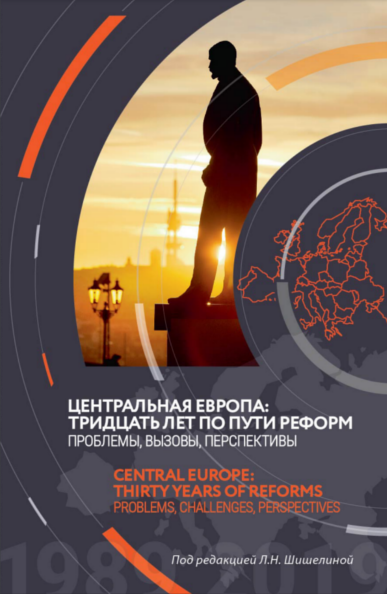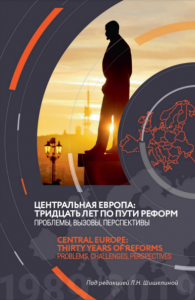Research & Studies

 A brand new book, Central Europe: Thirty Years of Reforms : Problems, Challenges, Prospects was released in 2021, edited by Lyubov Shishelina, who is a member of the iASK Advisory Board.
A brand new book, Central Europe: Thirty Years of Reforms : Problems, Challenges, Prospects was released in 2021, edited by Lyubov Shishelina, who is a member of the iASK Advisory Board.
It is based on the materials of the conference that the Visegrad Institute of Europe Russian Academy of Sciences organized and held in partnership with the Embassy of the Czech Republic in Moscow in December 2019, when the Czech Republic chaired the Visegrad Group. Several chapters of the book was written by iASK researchers.
Ferenc Miszlivetz: 1989–2019: Thirty Years after : Re-Enchanting Europe?
Abstract: This paper focuses on the complexities created by the interlinked and complex processes of Central-European transitions that arose as the result of integration into the EU and the undermining influence of turbo-capitalism. During the decades before and after the Annus Mirabilis, ’Europe’ and European integration were the models for peaceful regional integration worldwide. Due to the lack of a common vision for the future in “old” and “new” Europe, and due to unexpected internal and external challenges, and increased global uncertainties, the European dream gave way to a common European frustration. Evaluating the transformations of the past three decades, the question remains whether Europe can avoid further disintegration and gain back its role as a model for regional cooperation. Could this provide a window of opportunity for a more important role for Central Europe?
Keywords: solidarity, Central European cooperation, integration, common European home, nation-state paradigm, European civil society, uncertainty, transformation.
Jody Jensen: «Trans» without «Formation» — Reloaded : The Social Models of the Eastern and Central European Countries
Abstract: Although Europeans may have a common history, it cannot be said that we have a shared history. There are important differences in the way history was and is experienced, in social development, and also in terms of legacies. Many analyses of the complex and inter-related social, political and economic changes of the transformation in East and Central Europe have overlooked important criteria. They explain the process of transformation simplistically as a switch of economic models and ignore the fact that there are substantial differences between functioning market economies that are the result of different development processes. The opportunity that 1989 offered was not simply the introduction of functioning market economies, but to implement the much-postponed process of economic modernization in the region. The transition from a planned economy to a market economy should not have been viewed as the goal, but rather as the instrument for successful modernization. As economic transformation progressed, it became evident that any visible pattern of transformation must contain three elements: 1) the rules and institutions of the market economy, 2) a strategy for modernization (in terms of infrastructure), with 3) elements of the socialist heritage, mostly social welfare and education.
Keywords: migration crisis, social welfare models, transformation, work state.
Attila Pók: Some Interpretations of the Place of the Events of 1989–1990 in 20th Century History. Hungarian Perspectives
Abstract: The article is dedicated to the analyses of interpretations of the events that led to the burst out of reform processes in Central Europe 30 years ago, in 1989-1990. The author stresses that with the passing of time the focus of digging into the fertile soil of the bottomless depth of the past keeps shifting: political developments, environmental issues, great cultural achievements alike can mark major turning points in the narrations of global, regional, national, local pasts. Events of the past can be turned into historical narratives in numerous forms. The guild of historians have their own rules: the performance of politicians in dealing with the past is judged by the support they can gain in their fight for power. Among the major questions of investigation are: what happened in the world, in Europe, in the countries of the Soviet Bloc, in Hungary three decades ago? When does the process that led to the termination of the bipolar world, to the fall of European communist regimes, to the restructuring of power relations from the global to the East Central European local levels begin? How can one define the driving forces of changes and what could be considered the most important longer term consequences? The author gives a concise summary of some international and Hungarian interpretations of the transition process in Eastern and Central Europe, making also an attempt at pointing out the impact of the interpretations on the process itself.
Keywords: reforms, transition, opposition, post-communism, system change, new political order, Visegrad countries, Hungary
Publisher: Institute of Europe Russian Academy of Sciences
ISBN: 978-5-98163-171-9
DOI: http://dx.doi.org/10.15211/978-5-98163-171-9
The book is available with full text by clicking HERE.
© 2017-2023, All Rights Reserved